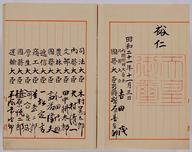Subject

photo credits: Wikimedia Commons
The Constitution of Japan (Shinjitai: 日本国憲法, Kyūjitai: 日本國憲󠄁法, Hepburn: Nihon-koku kenpō) is the constitution of Japan and the supreme law in the state. It was written primarily by American civilian officials working under the Allied occupation of Japan after World War II. The current Japanese constitution was promulgated as an amendment of the Meiji Constitution of 1890 on 3 November 1946 when it came into effect on 3 May 1947. The constitution provides for a parliamentary system of government and guarantees certain fundamental human rights. In contrast to the Meiji Constitution, which invested the Emperor of Japan with supreme political power, under the new constitution the Emperor was reduced to "the symbol of the State and of the unity of the people" and exercises only a ceremonial role acting under the sovereignty of the people for constitutional monarchy. The constitution, also known as the MacArthur Constitution, "Post-war Constitution" (戦後憲法, Sengo-Kenpō), or the "Peace Constitution" (平和憲法, Heiwa-Kenpō), was drafted under the supervision of U.S. General Douglas MacArthur, the Supreme Commander for the Allied Powers, during the Allied occupation of Japan after World War II. Japanese scholars reviewed and modified it before adoption. It changed Japan's previous system of semi-constitutional monarchy and stratocracy with a parliamentary monarchy. The Constitution is best known for Article 9, by which Japan renounces its right to wage war and maintain military forces. Despite this, Japan retains de facto military capabilities in the form of the Self-Defense Forces and also hosts a substantial American military presence. The Japanese constitution is the oldest unamended constitution in the world. It has not had any amendments to its text in more than 70 years. At roughly 5,000 words, it is a relatively short constitution; the average national constitution has about 21,000 words. Source: Wikipedia (en)
Works about The Constitution of Japan 1
Subject - wd:Q237082